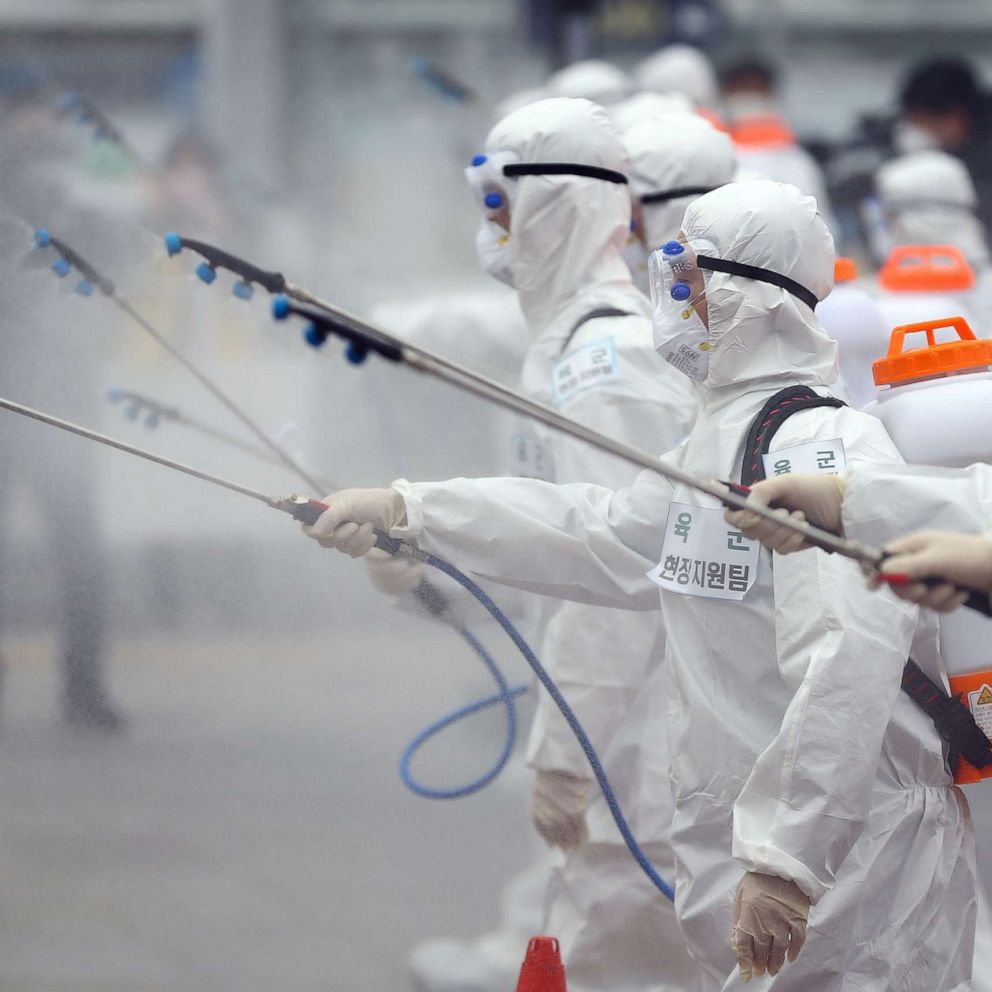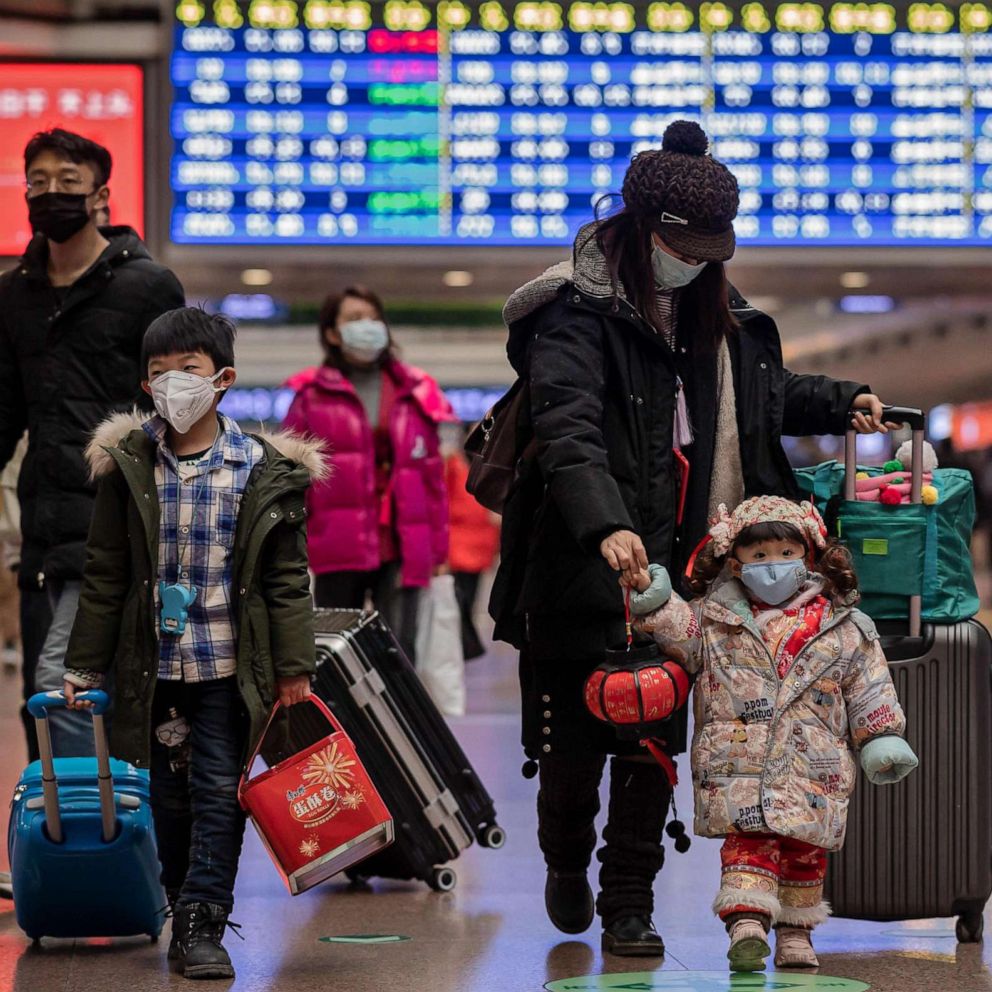Coronavirus government response updates: Fauci testifies consequences of reopening too soon could be 'really serious'
Fauci warned senators of "spikes that might turn into outbreaks."
The government's top infectious disease expert, Dr. Anthony Fauci, warned senators in a videoconference hearing Tuesday that the "consequences could be really serious" if states and localities reopen too soon.
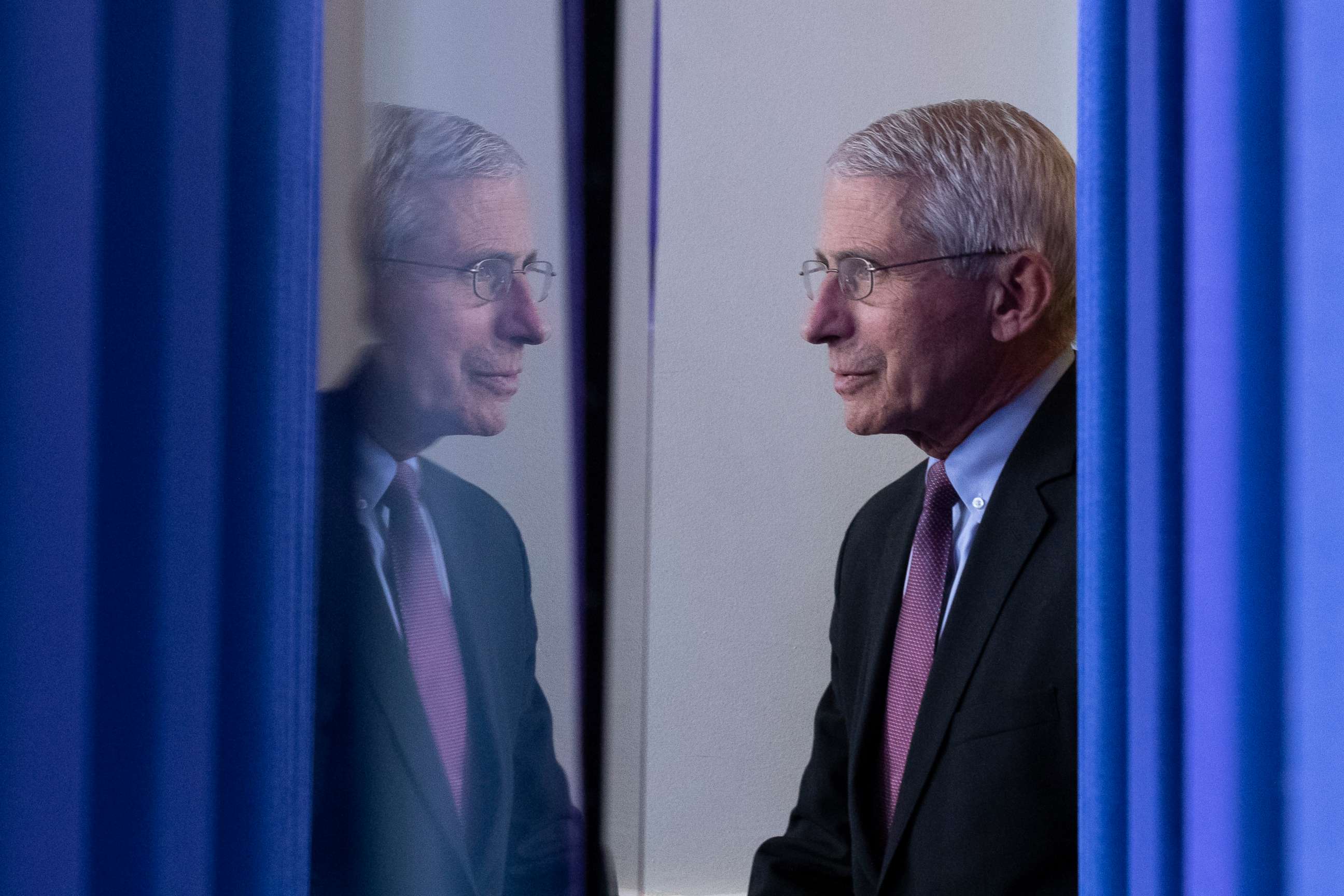
His testimony came after President Donald Trump on Monday exaggerated the availability of coronavirus testing in the U.S. on Tuesday in his push to reopen the country, claiming Americans returning to work can get tested daily "very soon," even though many governors disagree.
The Senate hearing Tuesday morning was the first time Fauci has testified since mid-March, and Democrats note he was doing so outside the presence of Trump.
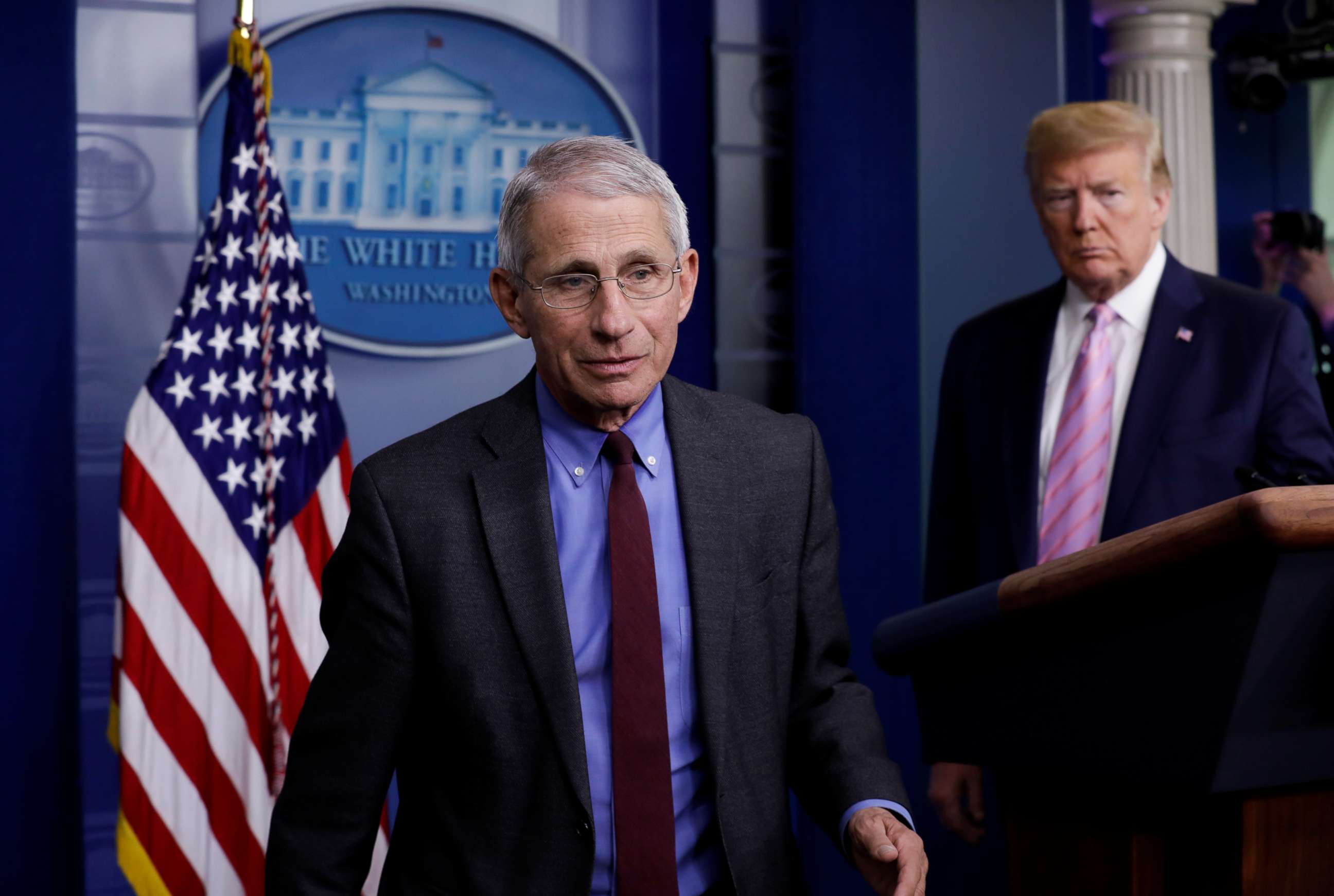
He testified -- along with some of the most prominent doctors on the president's coronavirus task force -- Centers for Disease Control and Prevention Director Robert Redfield, Food and Drug Administration Commissioner Stephen Hahn and coronavirus testing coordinator Adm. Brett Giroir -- in the historic hearing before the Senate Health Education, Labor and Pensions Committee dealing with questions surrounding reopening the economy, as more states lift restrictions meant to slow the spread of the virus.
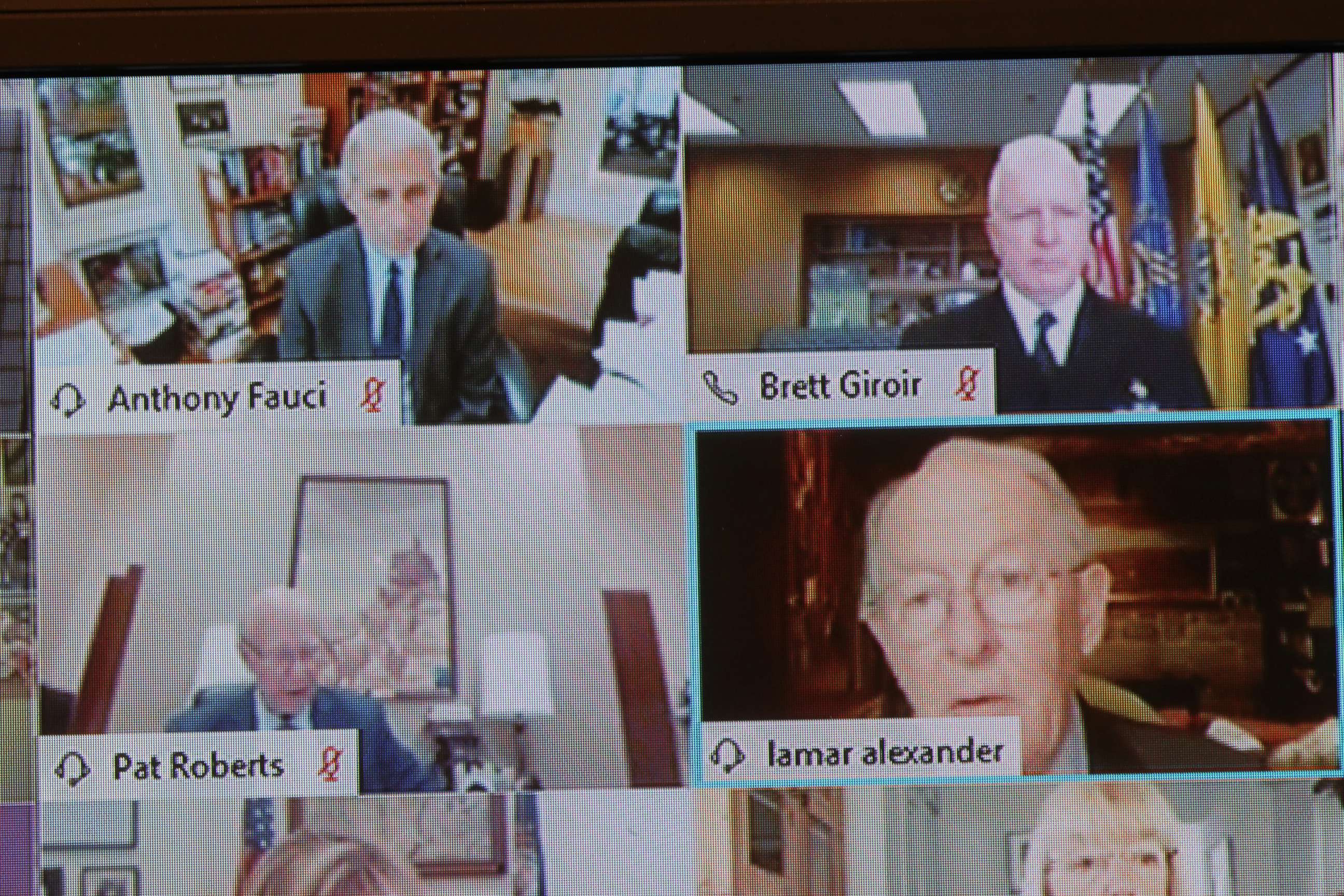
Three of the four witnesses -- Fauci, Redfield and Hahn -- are in some form of self-quarantine following "low risk" contact with at least one infected White House staff member. Even the committee chair, Sen. Lamar Alexander, R-Tenn., presided from his home state after one of his staff members, too, tested positive for the contagious pathogen.
The teleconference testimony also came as precautions are being put in place at the White House over fears the virus has invaded the West Wing, including a mandate that staffers must wear masks following positive coronavirus tests from one of the president's valets and the vice president's press secretary.
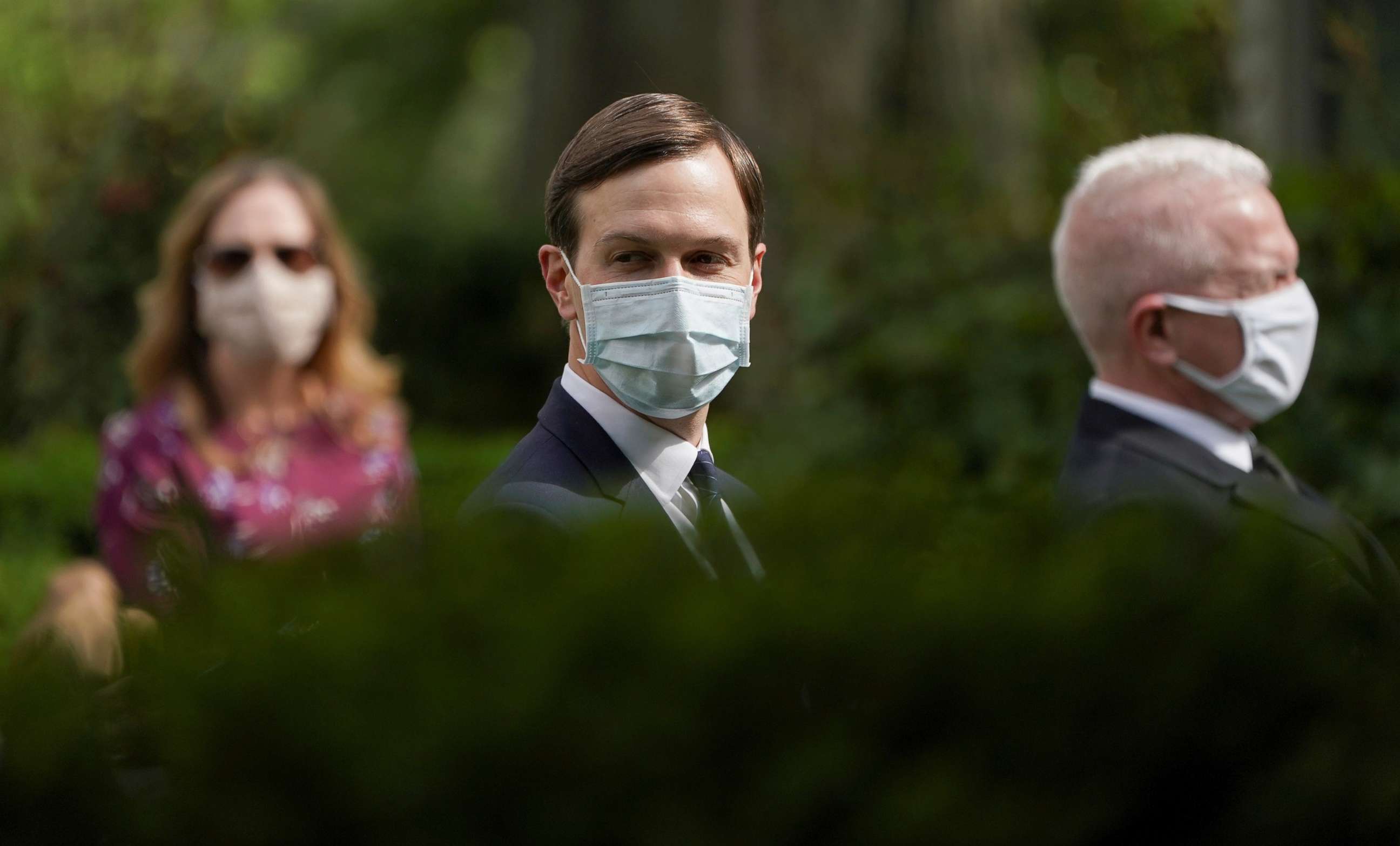
Tune into ABC at 1 p.m. ET and ABC News Live at 4 p.m. ET every weekday for special coverage of the novel coronavirus with the full ABC News team, including the latest news, context and analysis.
Here are Tuesday's most significant developments in Washington:
- Drs. Fauci, Redfield, Hahn and Giroir, of the coronavirus task force, testified before the Senate HELP Committee via videoconference with the chair presiding over the hearing remotely
- Fauci, Hahn and Redfield issue a rare, joint statement that they will attend meetings at the White House as long as they stay 6-feet apart and wear face coverings
- Trump and Pence are maintaining distance from each other for the immediate future
- Wearing masks in West Wing now mandatory for White House staff after Pence press secretary, Trump valet test positive
- Critics attack Trump's claim that 'We have prevailed on testing' at Rose Garden news conference
Here is how the Senate hearing unfolded.
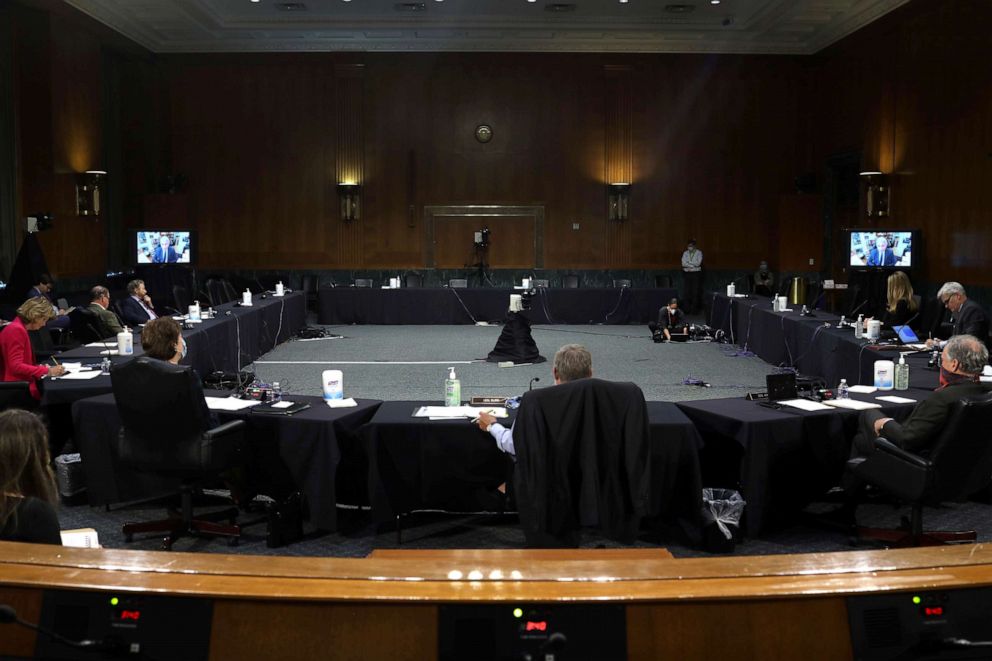
1:15 p.m. All four witnesses say they have no confrontational relationship with Trump
Before the hearing ended at 1:30 p.m., Sen. Kelly Loeffler, a Georgia Republican, asked each of the witnesses to characterize their relationship with Trump and all four said there was no confrontational relationship whatsoever and that they could speak freely.
"There is certainly not a confrontational relationship between me and the president, as I mentioned many times," Fauci answered first. "I give advice and opinions based on evidence-based scientific information. He hears that. He respects it. He gets opinions from a variety of other people, but in no way, in my experience over the last several months, has there been any confrontational relationship between us."
Redfield, Hahn and Giroir echoed their colleague.
"I've always felt free to give the best public health advice that I think needs to be given at the time," Redfield added.
"I do not have a confrontational relationship, -- had not had a confrontational relationship with the president," Hahn said. "He asks questions. I have given him my honest answers rooted in data and science, and he has listened respectfully to those Incorporating that into his decision making."
Finally, Giroir said that the entire group have a close working relationship and included a shout-out to coronavirus response coordinator Dr. Deborah Birx.
"We work very closely together -- all the scientists, all the physicians," Giroir added. "We have a very productive working relationship with each other and also with the president and vice-president. It would not be confrontational. I firmly feel that we have the ability to honestly state our opinions and recommendations. That's been that way since the beginning."
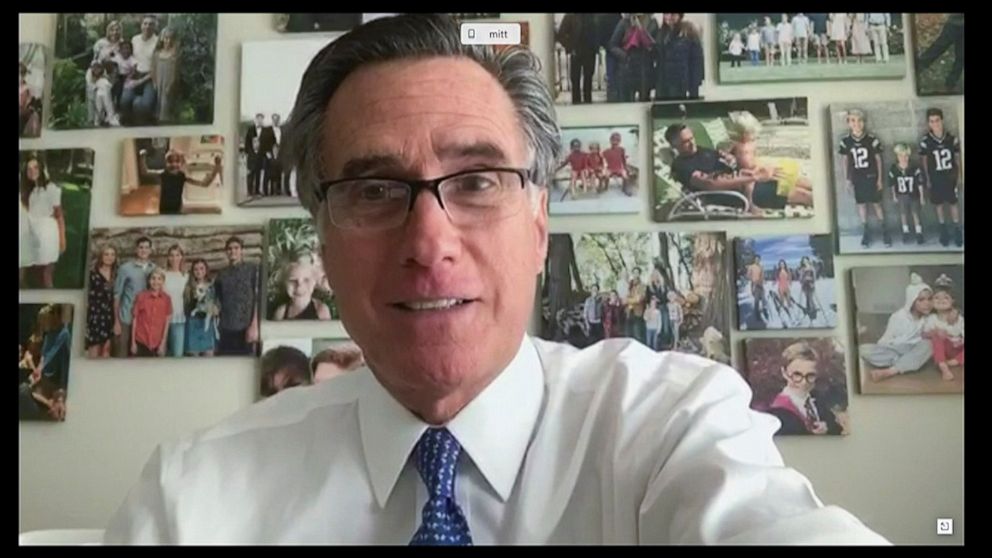
12:55 p.m. Romney says US testing record 'nothing to celebrate whatsoever'
Utah Sen. Mitt Romney, the only Republican to vote to convict Trump in his impeachment trial earlier this year, began his remarks with a thinly veiled criticism of Adm. Brett Giroir, who is overseeing the administration's testing efforts.
"I understand the politicians are going to frame data in a way that's most positive politically -- of course I don't expect that from admirals -- but yesterday you celebrated that we had done more tests and more tests per capita even in South Korea, but you ignored the fact that they accomplished theirs at the beginning of the outbreak," Romney said, adding that while the U.S. "treaded water during February and March," South Korea was conducting robust testing.
"Partially, as a result of that, they have 256 deaths and we have almost 80,000 deaths. I find our testing record nothing to celebrate whatsoever. The fact is, their test numbers are going down, down, down, down now because they don't have the kind of outbreak we have. Ours are growing up," Romney said. "I think that's an important lesson for us as we think about the future."
Romney then asked Fauci if former President Barack Obama or Trump have done anything to delay a coronavirus vaccine, after Trump has claimed for months that his predecessor left him without the tools to fight the virus.
"No, no, not at all," Fauci said. "Certainly, President Obama nor President Trump are responsible for not having a vaccine."
12:07 p.m. Fauci tells Warren that the virus isn't 'completely under control'
Pointing out that Fauci has advised six presidents and battled deadly viruses for his entire career, Sen. Elizabeth Warren, D-Mass., asked him point-blank: "Do we have the coronavirus contained?"
"It depends on what you mean by containment. If you think that we have it completely under control, we don't," Fauci said. "If you look at the dynamics of the outbreak, we are seeing a diminution of hospitalizations and infections in some places, such as in New York City, which has plateaued and started to come down the wall ends, but in other parts of the country, you're seeing spikes."
"I think we're going in the right direction, but the right direction does not mean we have by any means total control of this outbreak," he added.
Warren also asked Fauci about the severity of the virus returning in the fall, as he has previously warned will happen, to which Fauci said it all depends on how they prepare for it now.
"If we do not respond in an adequate way, when the fall comes, given that it is without a doubt that there will be infections that will be in the community, then we run the risk of having a resurgence. I would hope by that point in time, in the fall, that we have more than enough to respond adequately. But if we don't, there will be problems," Fauci said
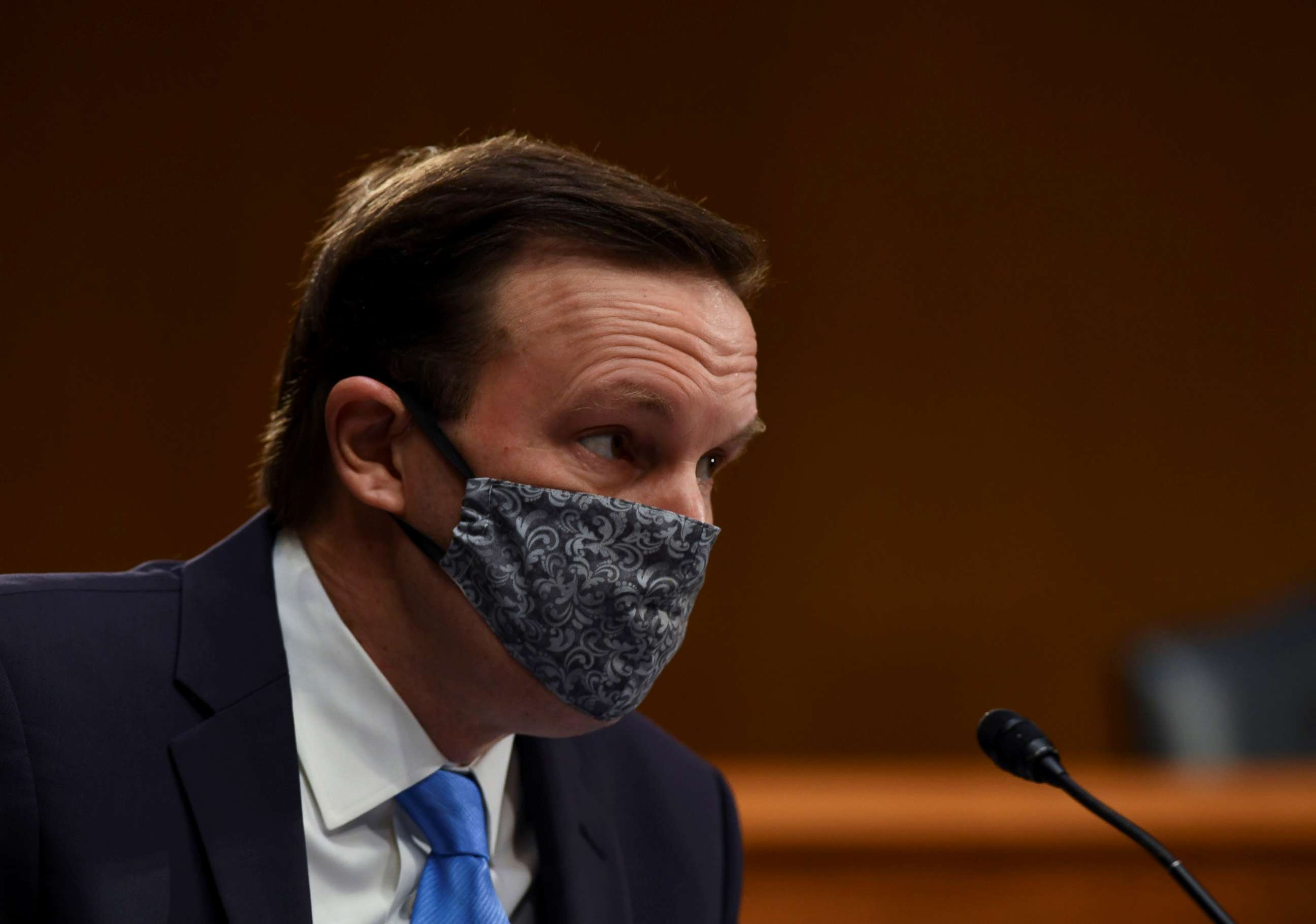
11:55 a.m. Murphy presses witnesses on whereabouts of additional CDC guidance on reopening
Sen. Murphy, D-Conn., first asked the witnesses if they were taking salary, to which they all replied yes, before Murphy used it as an example of income inequality amid the coronavirus outbreak, which he argued the federal government should be helping with.
"Quarantine is relatively easy for people like you and me. We can still work and get paid, but there are millions of other Americans who work jobs that can't be performed from home or are paid by the hour," Murphy said.
"It's just remarkable to me that this administration has not yet developed a mechanism for states to implement and pay for a quarantine system that will work for all Americans. Your plan to reopen America requires states to develop that plan and yet my state has no clue how to implement and pay for that system without help from the federal government," he said.
Murphy prefaced his second question by saying, "I worry that you're trying to have it both ways. You say this state shouldn't open too early. But then you don't give us the resources to succeed."
The senator went on to question when follow up guidance to the White House's reopening guidelines would be released by the CDC, adding, "My state needs it. We don't have all of the experts that you have and so we rely on you."
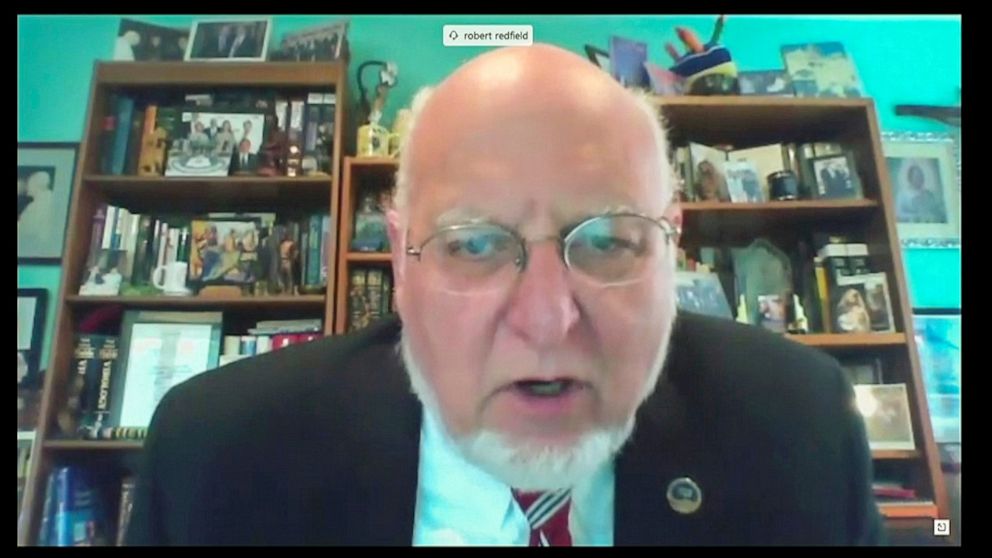
Redfield said new guidance would go online "soon," but Murphy responded, that "isn't very helpful" as states are already reopening.
"We're reopening in Connecticut in five days, in 10 days -- this guidance isn't going to be useful to us in two weeks," Murphy said.
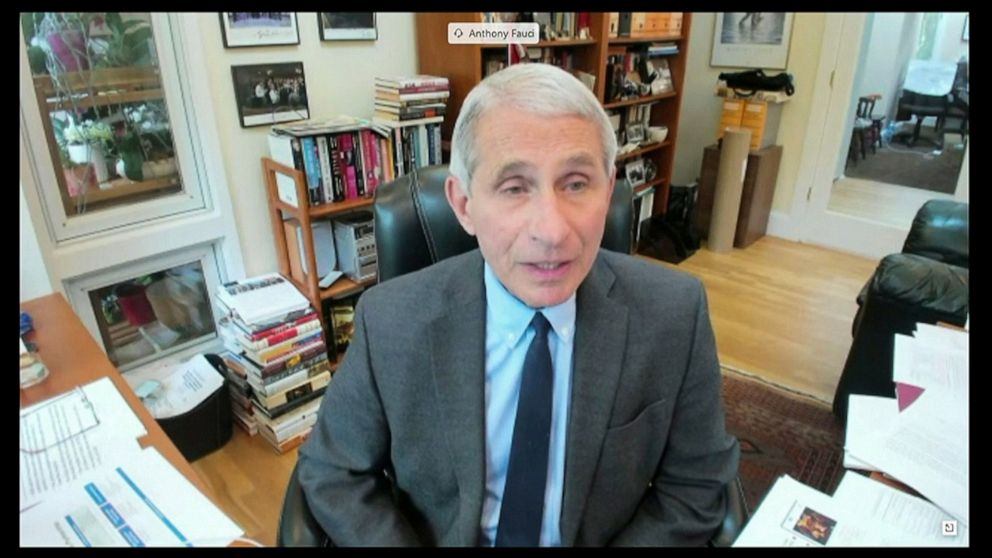
11:35 a.m. Fauci turns Paul's argument on humility around on Kentucky Republican
Sen. Rand Paul, R-Ky., used his question time to suggest kids suffering less from coronavirus means schools should reopen and that the U.S. should consider following Sweden's model of no mitigation.
"I think the one-size-fits-all, that we're gonna have a national strategy and nobody is going to go to school is kind of ridiculous," Paul said. "I think they will have a little bit of humility and our belief that we know what's best for the economy and, as much as I respect you, Dr. Fauci, I don't think you are the end-all."
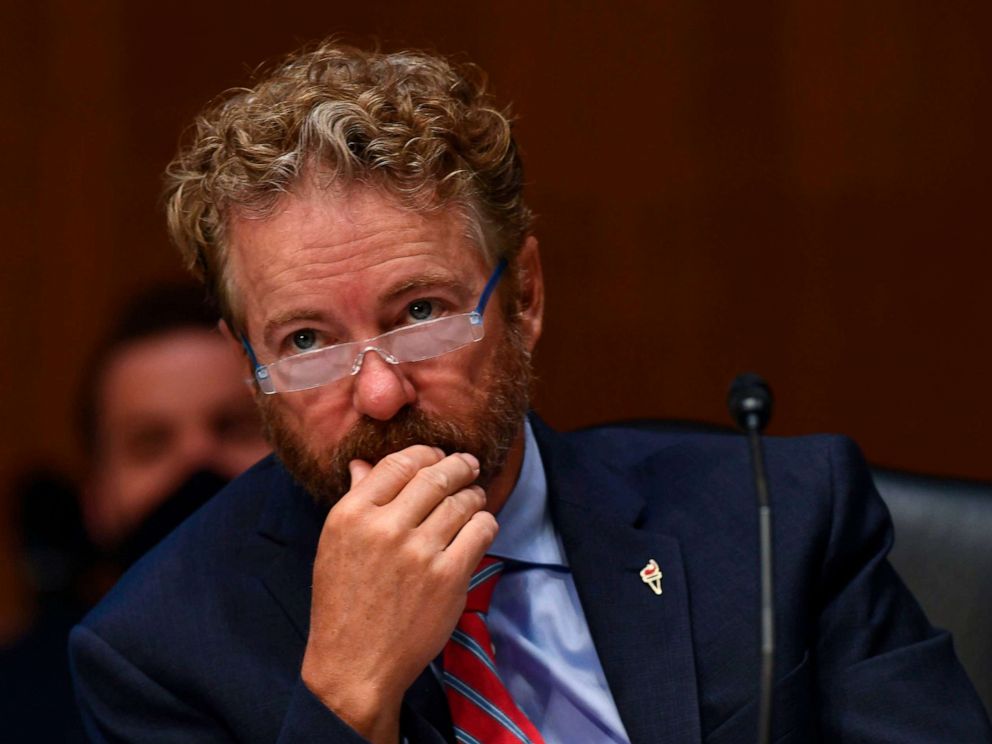
In a rare move, Fauci asked to respond to the senator with only 32 seconds left on the clock, first by thanking Paul for his comments.
"I have never made myself out to be the end-all, and only voice, in this. I'm a scientist, a physician and a public health official, I give advice, according to the best scientific evidence. There are a number of other people who come into that and give advice that are more related to the things that you spoke about the need to get the country back open again and economically. I don't give advice about economic things. I don't get advice about anything other than public health," Fauci said.
"The second thing is that you use the word we should be 'humble' about what we don't know. And I think that falls under the fact that we don't know everything about this virus, and we really better be very careful, particularly when it comes to children, because the more and more we learn, we're seeing things about what this virus can do that we didn't see from the studies in China, or in Europe," Fauci cautioned the senator.
"We've got to be careful, if we are not cavalier, in thinking that children are completely immune to the deleterious effects," he added. "I am very careful and hopefully humble in knowing that I don't know everything about this disease, and that's why I'm very reserved in making broad predictions."
11:30 a.m. Fauci warns reopening too soon could lead to even worse outbreaks and economic fallout
Sen. Bob Casey, D-Penn., asked Fauci to repeat concerns that he touched on in Sen. Patty Murray's earlier questioning, and he again said that while he understands the push to reopen, he said some areas run the risk of triggering an even worse outbreak -- with worse economic impacts.
"My concern is that as states or cities or regions, their attempt -- understandable -- to get back to some form of normality, disregards to a greater or lesser degree the checkpoints that we put in our guidelines, about when it is safe to seed and pulling back on mitigation," Fauci said.
"If that occurs, there is a real risk that you will trigger an outbreak that you might not be able to control -- which in fact will set you back, not only leading to some suffering and death that could be avoided, but could even set you back and almost turn the clock back rather than going forward," he testified.
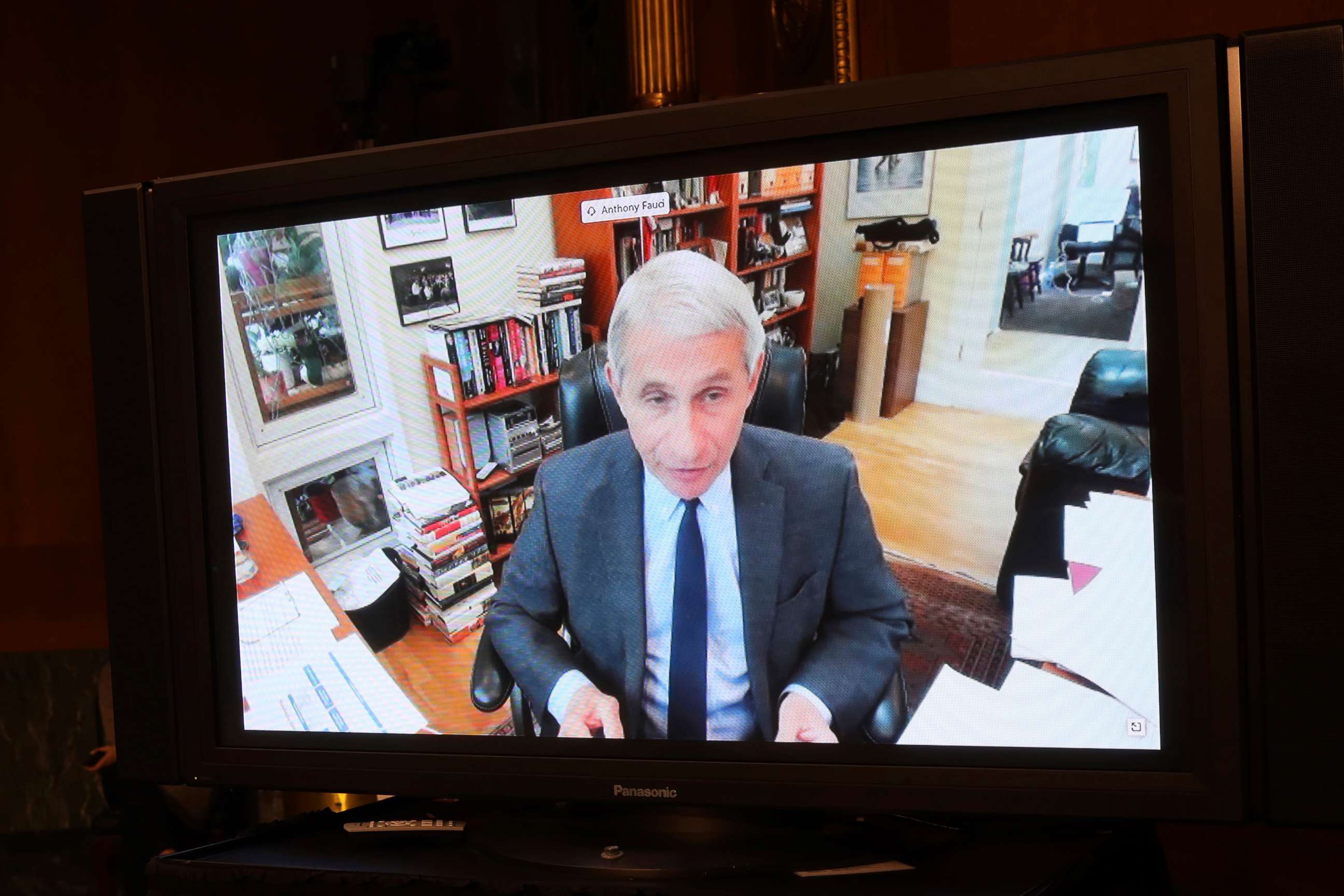
11:15 a.m. Fauci says death toll likely higher than what's been reported
In questioning by Sen. Bernie Sanders, I-Vt., Fauci revealed his belief, along with many of his colleagues, that the COVID-19 death toll is probably higher than what's been reported -- over 80,000, so far.
"Most of us figure the number of deaths is likely higher. Given the situation, particularly in New York City, when they were really strapped with a very serious challenge to their health care system, there may have been people who died at home who did have COVID who were not counted as COVID, because they never really got to the hospital," Fauci said.
"I think you are correct that the number is likely higher. I don't know exactly how much higher, but almost certainly higher," he said.
11 a.m. Fauci: If guidelines not followed, 'the consequences could be really serious'
Alexander's first question to Fauci is what he would advise the chancellor of the University of Tennessee as schools grapple with the decision to return in the fall.
"I would tell her," Fauci said, "that in this case, that the idea of having treatments available, or a vaccine, to facilitate the re-entry of students into the fall term would be something that would be a bit of a bridge too far.
Fauci went on to say that it would be a different situation if a vaccine was already available.
"If this were a situation where we had a vaccine, that would really be the end of that issue in a positive way. But as I mentioned in my opening remarks, even at the top speed we're going, we don't see a vaccine playing in the ability of individuals to get back to school this term," Fauci said.
Later, as he wrapped up the hearing Alexander also asked Fauci to clarify whether he meant to say that students should not return to school until we have effective treatments and vaccines.
Fauci responded that decisions about going back to school should be made based on the rate of infection in a given area, which will require more testing, but that he wasn't saying schools should wait until a vaccine or treatments are available to reopen.
"What I was referring to is that going back to school would be more in the realm of knowing the landscape of infection with regard to testing and as Adm. Giroir said, it would depend on the dynamics of the outbreak in the region where the school is," Fauci said. "I did not mean to imply at all any relationship between the availability of a vaccine and treatment and our ability to go back to school. You are quite correct."
During the hearing, Murray brought up Fauci's warning "of needless suffering and death" if the country opens too soon, in her first question, asking the doctor what is his most important message for communities and states that may be reopening too soon.
"I get concerned if you have a situation where the dynamics of an outbreak in an area are such that you are not seeing that gradual 14-day decrease that would allow you to go to phase one," Fauci said, pointing to the White House guidelines on reopening and a "gating criteria" that is not being followed in certain areas. "When you jump over those various checkpoints and prematurely open up, without having the capability of being able to respond effectively and efficiently, my concern is that we will start to see little spikes that might turn into outbreaks."
Fauci went on to say that if a community doesn't go by the White House guidelines, "the consequences could be really serious."
"There is no doubt, even under the best of circumstances, when you pull back on mitigation, you will see some cases appear," Fauci said. "It's the ability and the capability of responding to those cases with good identification, isolation, and contact tracing, to determine whether you can continue to go forward as you try to reopen America -- so it's not only doing it at the appropriate time, with the appropriate constraints, but having in place the capability of responding when the inevitable return of infections occur."
Based on ABC News latest analysis, no states currently easing restrictions have seen a decline in cases for 14 days in a row, as the White House guidelines dictate they should before moving onto "phase one" of reopening.
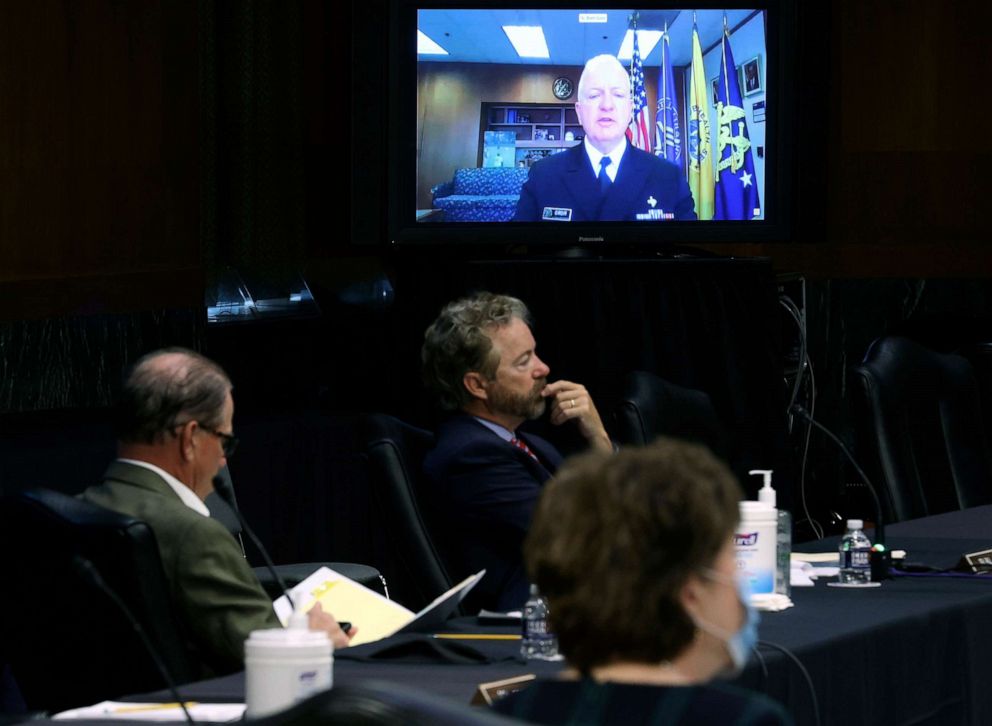
10:35 a.m. Fauci warns of the unknown efficacy of vaccine candidates in opening statement
Fauci outlined the goals of the NIH in addressing the pandemic and, ever cautious, offered a word of warning as the world waits for a safe coronavirus vaccine.
"The strategic plan that we have is four-fold. One, to improve our fundamental knowledge of the virus and the disease it causes. Next, to develop new point-of-care diagnostics. Next, to characterize and test therapeutics. And finally, develop safe and effective vaccines," Fauci said, adding that there are "at least eight candidate COVID-19 vaccines" currently in clinical development.
"I must warn that there's also the possibility of negative consequences, where certain vaccines can actually enhance the negative effect of the infection," he added. "The big unknown is efficacy."
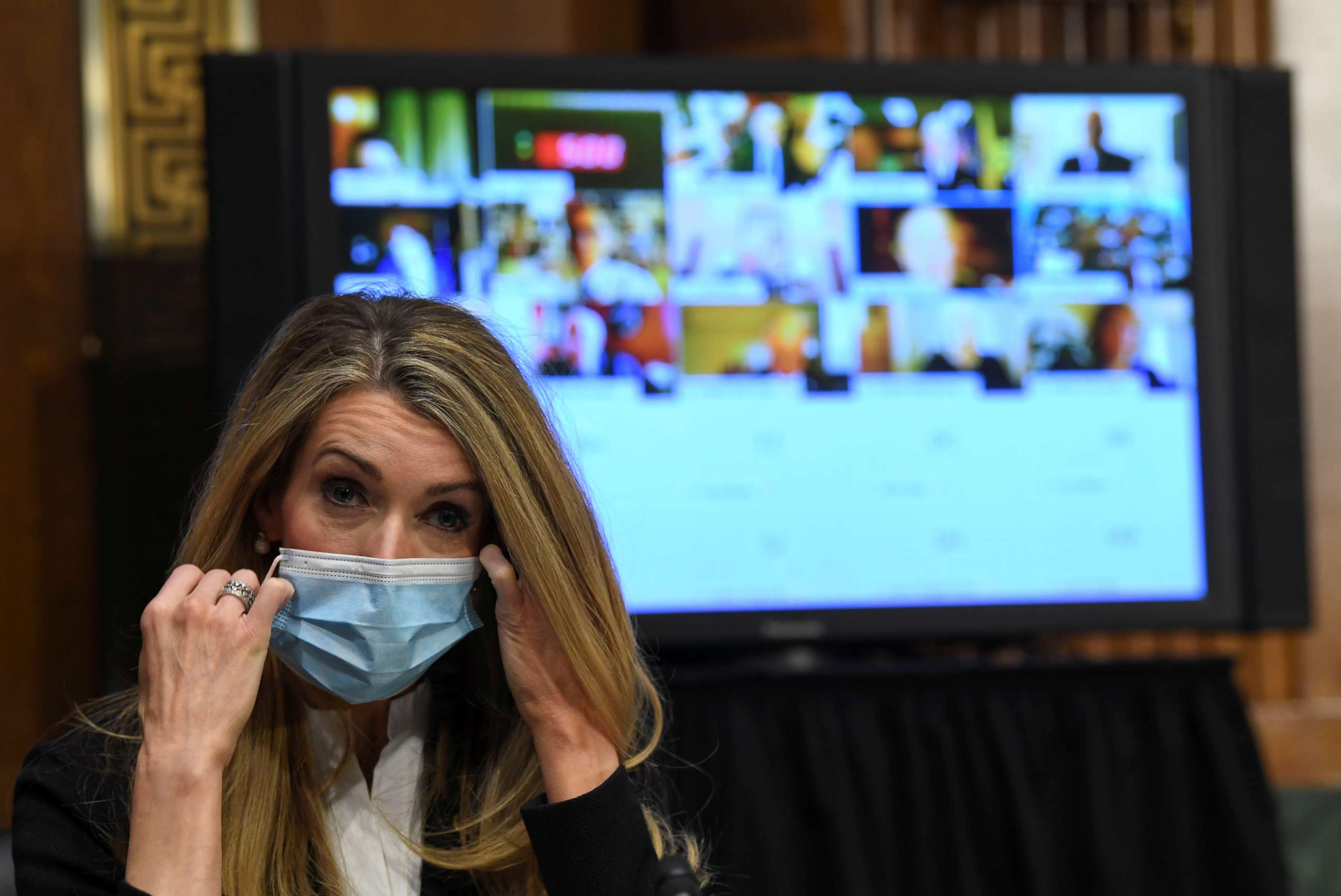
10:25 a.m. Top Democrat Sen. Murray says public 'counting on us for the truth'
In her opening statement, Ranking Member Sen. Patty Murray, D-Wash., questioned whether the president was telling the truth about the government's response, and while she said agreed with Alexander's call for ramped-up testing, she said "testing alone won't be enough to reopen our country."
"I'd like to thank, not only our witnesses for joining us today, but also our committee staff are working to set up a safe format for members and witnesses, and the public to participate in this hearing remotely families across the country are counting on us for the truth about the COVID-19 pandemic. Especially since it is clear they will not get it from President Trump," Murray began. "Lives are at stake."
Murray ticked through a list of what she called "delays" and "missteps" by the administration such as allowing inaccurate antibody tests to flood the market and falling behind on outbreaks at meatpacking plants and nursing homes.
"We recently learned that after experts at the Centers for Disease Control and Prevention spent weeks, developing a detailed guide to help our communities understand how to safely reopen when the time comes, the Trump administration tossed it in the trash bin for being too prescriptive," she added.
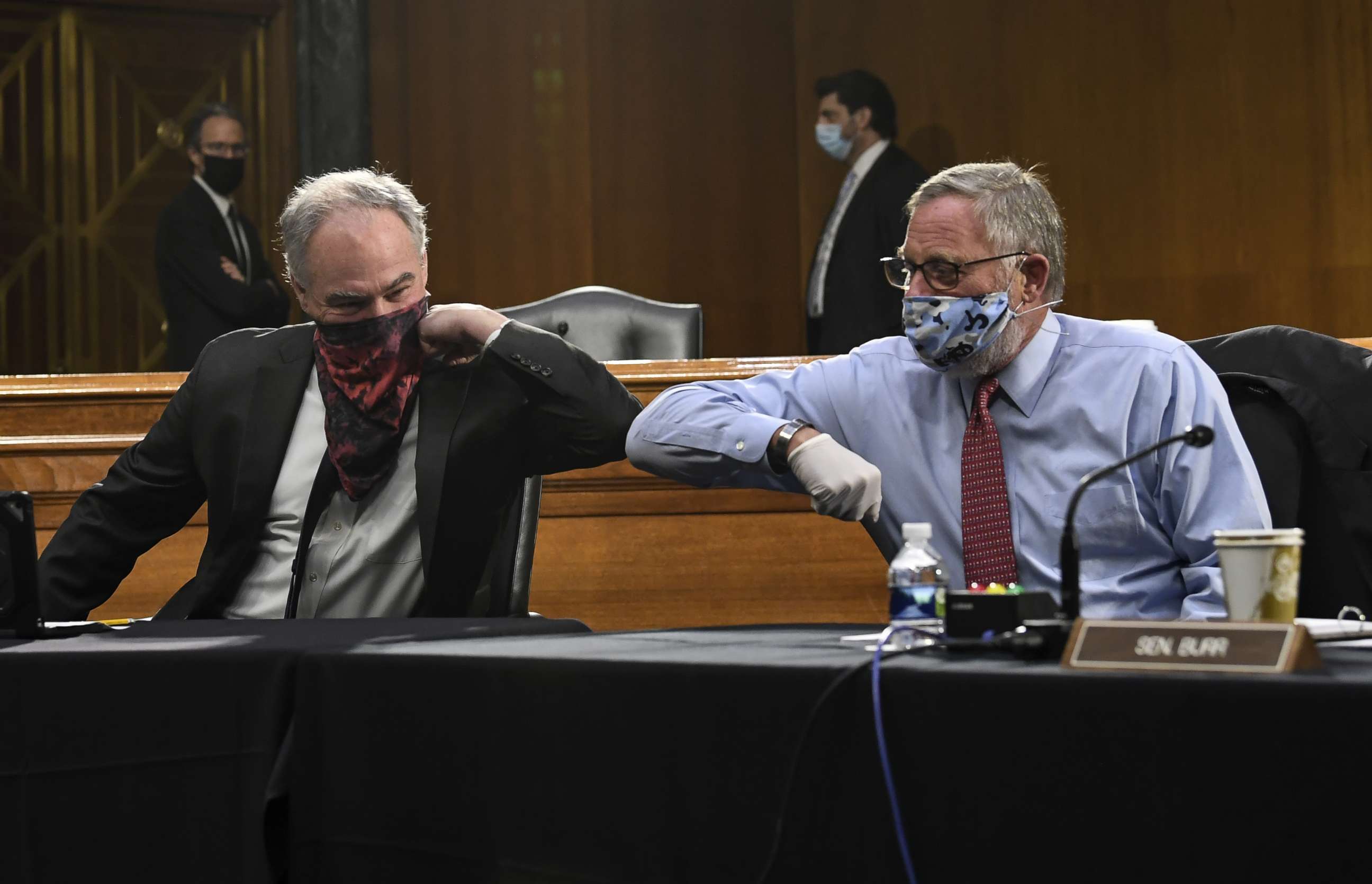
10:10 a.m. Sen. Alexander begins hearing from Tennessee home
The Senate Health, Education, Labor and Pensions Committee Chair Sen. Lamar Alexander, R-Tenn., in his opening statement Tuesday morning, kicked off the historic video conference hearing with an emphasis on coronavirus testing and an acknowledgement that it currently falls short.
"Vaccines and treatments are the ultimate solutions, but until we have them, all roads back to work and back to school go through testing. The more tests we conduct, the better we can identify the small number of those who are sick and track those who they have had contact with," he said. "Then we can quarantine the sick and exposed instead of trying to quarantine the entire country with disastrous effects on our economic wellbeing," Alexander said. "That's why I said last Thursday, what our country has done so far in testing is impressive, but not nearly enough."
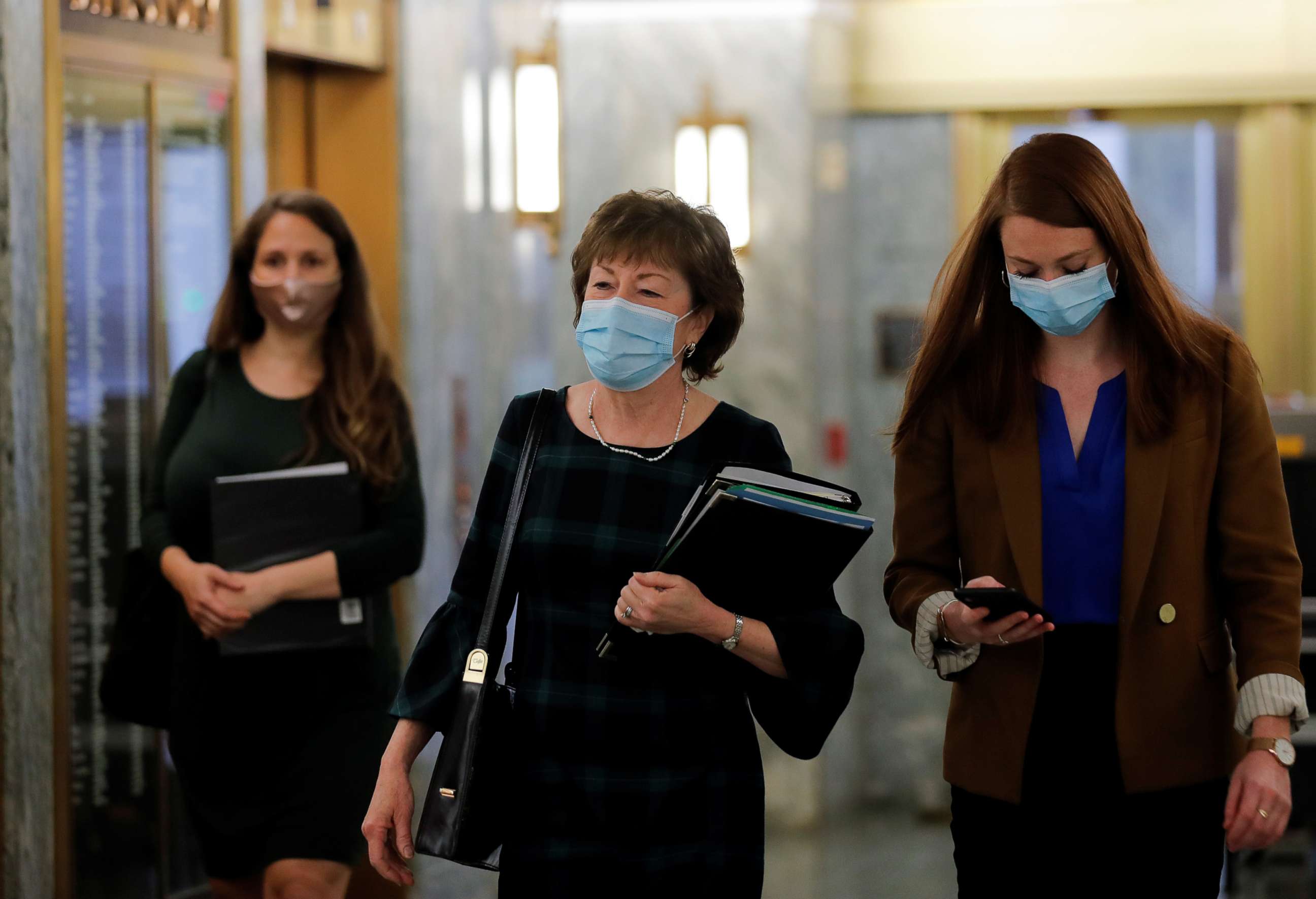
Also from today:
Russian ventilators, shipped to US as part of aid package, not being deployed
New York and New Jersey are returning to the federal stockpile 45 Russian ventilators shipped to the states as part of an aid package from Moscow, officials tell ABC News.
The decision to return the equipment follows reports that five coronavirus patients in St. Petersburg were killed in fires linked to overloaded ventilators.
In a statement provided to ABC News, the Federal Emergency Management Agency said the Russian ventilators hadn't been "deployed" yet to New Jersey or New York hospitals and remained in storage because they weren't needed.
"Out of an abundance of caution, the states are returning the ventilators to FEMA," the spokesperson said in a statement. "The conclusion(s) of the investigation being conducted by the Russian authorities into the fire in St. Petersburg will help inform our decision regarding any future use of the ventilators."
ABC News first reported that Moscow had billed the U.S. nearly $660,000 for its medical aid flight last month that included thousands of pieces of equipment not typically used by hospitals, including chemical warfare-style gas masks and household cleaning gloves, according to a government record of the shipment.
Two officials said around the time of the April 1 flight that the 45 ventilators onboard were not immediately useable because of voltage-related issues. FEMA later denied there was any problem with the ventilators, insisting in a statement provided last week that "to the best of our knowledge, the ventilators were 'immediately usable' relative to the voltage requirements."
ABC News' Anne Flaherty
House Democrats unveil $3T relief bill with aid to states, more direct payments to Americans
House Democrats have unveiled a massive $3 trillion coronavirus relief package, including a second round of direct payments of $1,200 per family member and up to $6,000 per household, among several other measures, and are planning to vote on it Friday, despite Republican opposition.
"The chairman of the Federal Reserve Bank has told us to think big because interest rates are so low," Pelosi said, defending the measure's cost. "We intend to use those low interest rates to bolster the American people. ... Not acting is the most expensive course."
Democratic leaders announced the House will vote on the nearly 2,000 page bill in just three days, even as GOP leaders in the Senate such as Sen. Lindsey Graham, R-S.C., have already deemed it "dead on arrival."
After knocking the bill as a "liberal wishlist," Senate Majority Leader Mitch McConnell doubled down on his criticism Tuesday.
"We're going to insist on doing narrowly targeted legislation, if and when we do legislate again -- and we may well -- that addresses the problems, the needs, and not the aspirations of the Democrat majority in the House," McConnell said.
"Look -- we can't spend enough money to prop this economy up forever," the Kentucky Republican added. "People need to be able to begin to be productive again."
ABC News' Mariam Khan
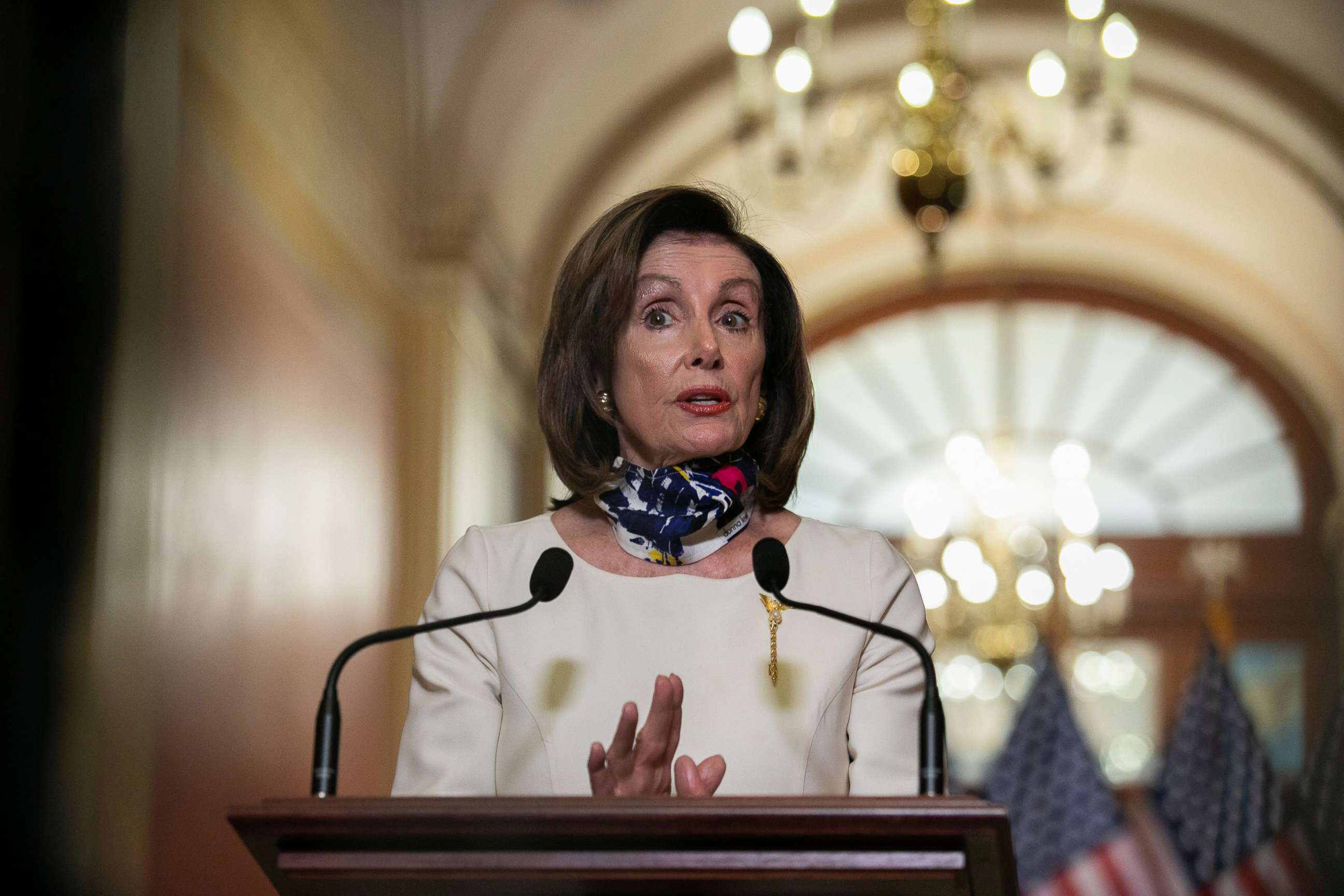
WH press secretary says CDC guidance for reopening 'in the works' -- but doesn't give timeline
Following discussion in the earlier Senate HELP hearing about schools reopening, ABC News Correspondent Kyra Phillips asked the White House press secretary if and when the White House would issue guidance for communities on how and when they can reopen.
"I would direct you to our guidance that currently exist, and there is that CDC guidance that is in the works, that is forthcoming that will provide additional details," Kayleigh McEnany said.
Though McEnany didn't offer a timeline, several senators on the committee including Sen. Chris Murphy, D-Conn., said that states are awaiting that guidance and need it in days, not weeks, as more governors ease restrictions.
Asked when Fauci and Birx might be back to the briefing room podium, McEnany wouldn't commit and instead said Fauci spent a lot of time testifying and that "these experts" do regular television interviews.
"We'll see the next time they are up here in this capacity, but they -- we certainly have valued their time and we continue to value their time," she said.
ABC News' Ben Gittleson
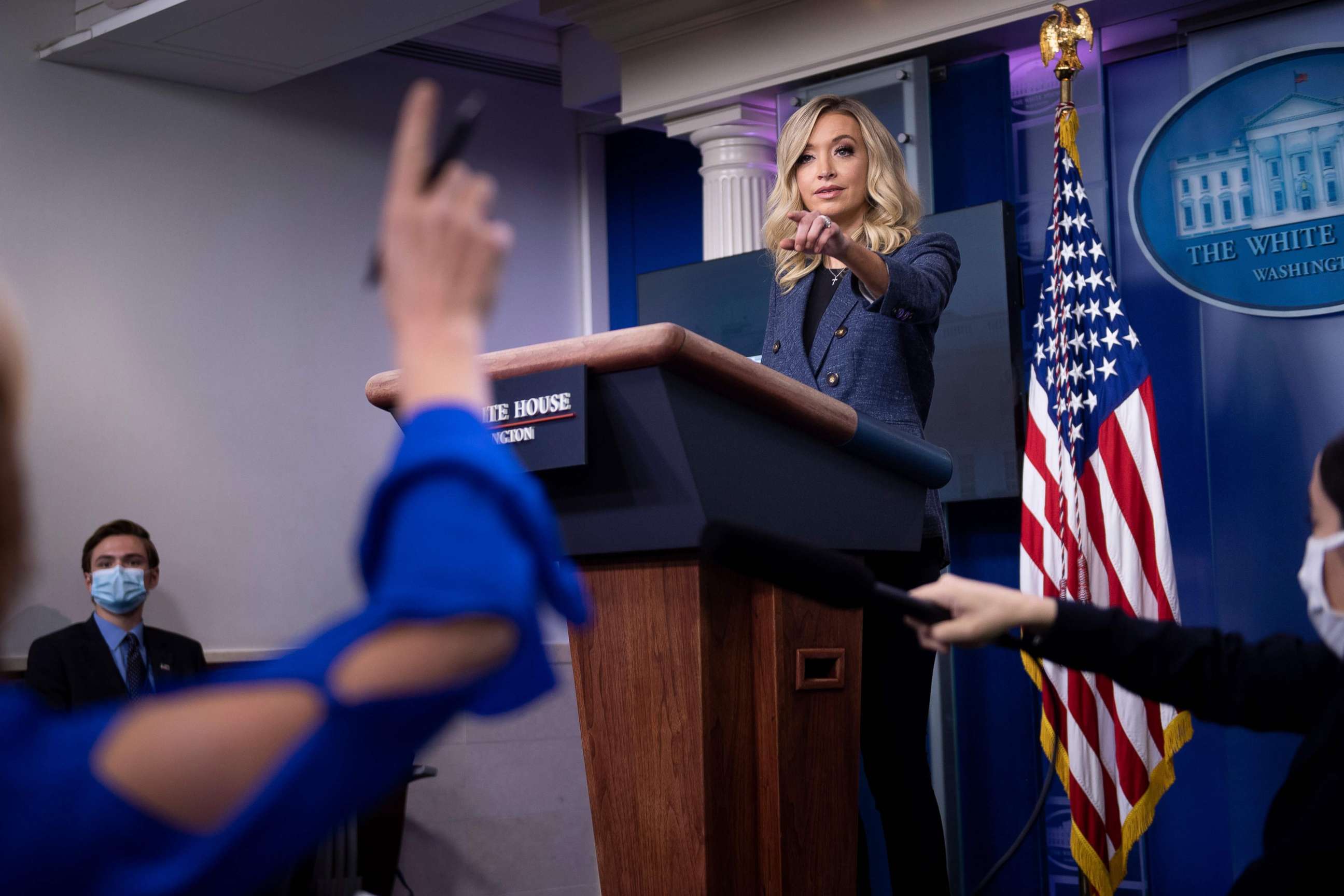
Trump and Pence to maintain distance from each other, WH press secretary says it was Pence's decision
President Donald Trump and Vice President Mike Pence will maintain distance from each other in the immediate future, according to a senior administration official.
It comes after Pence, though present in Washington, was notably not in attendance at Trump's briefing Monday in the Rose Garden.
Asked Tuesday afternoon about Trump and Pence maintaining distance, White House press secretary Kayleigh McEnany claimed that it was the vice president's choice.
"The vice president has made the choice to keep his distance for a few days, and I would just note that that's his personal decision to make that. As to how many days he does it, again, that's a decision for the vice president."
ABC News' Katherine Faulders
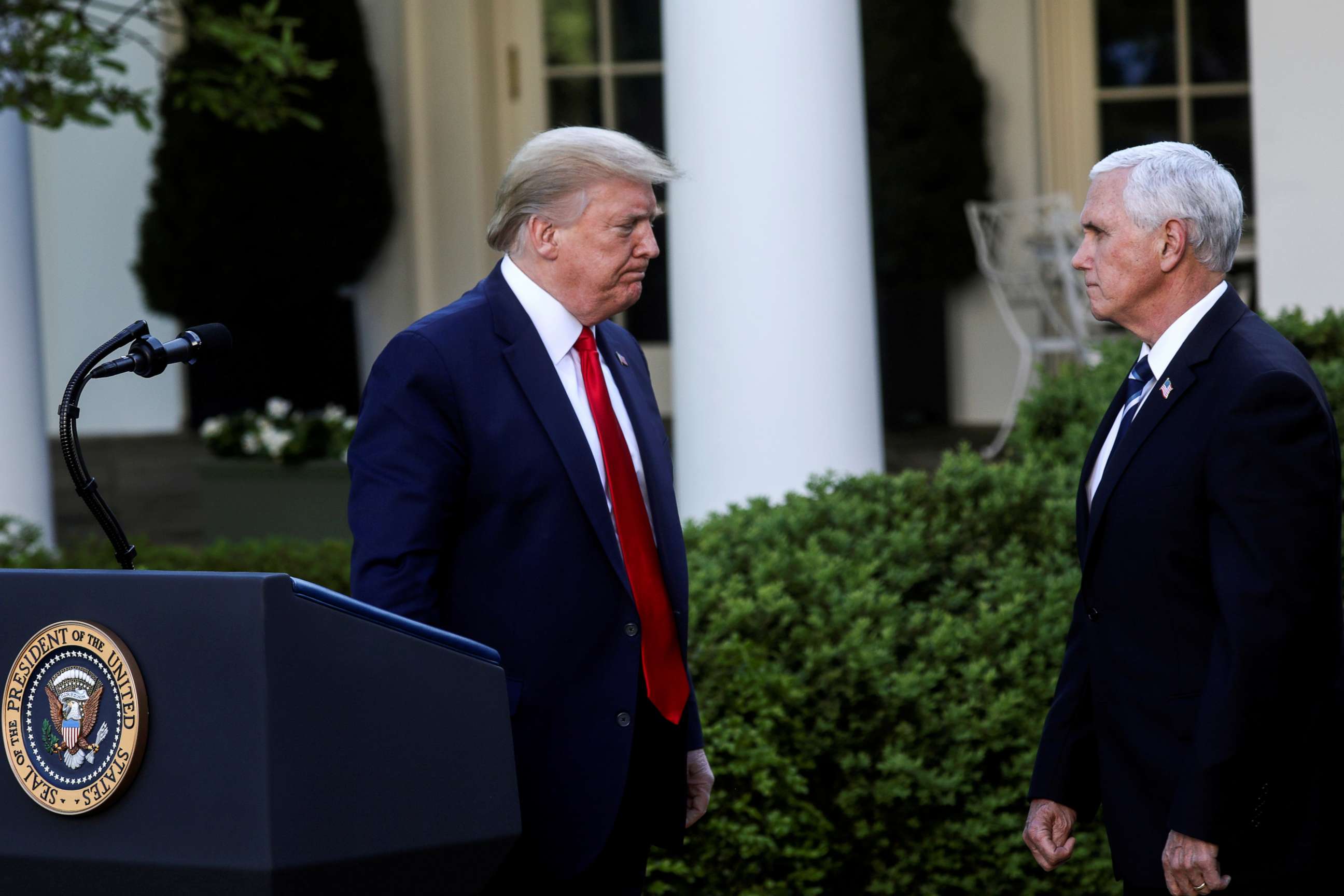
ABC News' Mariam Khan and Stephanie Ebbs contributed to this report.
What to know about Coronavirus:
- How it started and how to protect yourself: Coronavirus explained
- What to do if you have symptoms: Coronavirus symptoms
- Tracking the spread in the US and Worldwide: Coronavirus map

